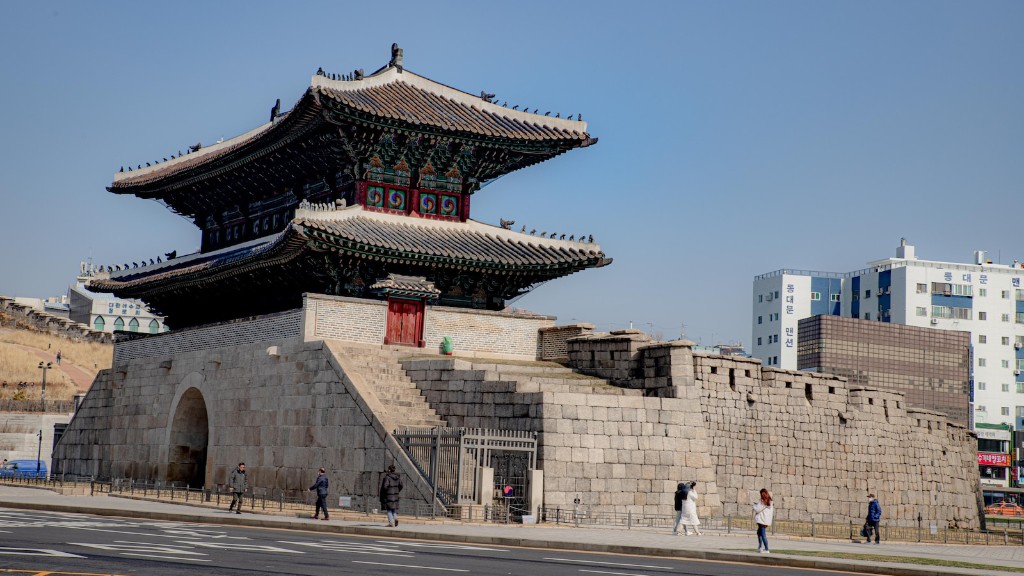Impact on the Region
The potential impacts of North Korea’s actions on its neighbours can’t be understated. Tensions in the region have mounted over the past decade, with Pyongyang threatening to launch missiles towards Japan, South Korea, and other nearby countries. The potential implications of a nuclear North Korea on the region’s security and stability, as well as that of the United States, are significant.
The threat of a nuclear North Korea has also had an impact on the militaries of South Korea and Japan. Both countries have increased their military spending in recent years to counter the growing North Korean threat, with Seoul and Tokyo allocating large portions of their national budgets to defense.
Experts worry that if the North Korean government is allowed to continue its weapons programs, it could spark a regional arms race, which could escalate tensions in the area. Furthermore, they fear that North Korea may use nuclear weapons as a bargaining chip against its neighbours, and could even force them to make concessions through nuclear blackmail.
At the same time, North Korea’s increasingly belligerent behavior has also had an economic impact on the region. Economic sanctions imposed on the country by the United Nations, the U.S., and other countries have had a devastating effect on North Korea’s economy, with many of the country’s citizens living in poverty.
The sanctions have also had an effect on North Korea’s neighbors, including South Korea, Japan, and China. The economic toll of the sanctions, as well as North Korea’s threats to carry out nuclear attacks, has had a chilling effect on businesses in the region, as many are wary of investing in a region with so much geopolitical uncertainty.
International Responses
In recent years, the international community has responded to North Korea’s growing nuclear threat in a variety of ways. In 2017, the United Nations Security Council (UNSC) imposed unprecedented sanctions on the country in a bid to put an end to its weapons program.
The sanctions imposed by the UNSC include a ban on the sale of certain materials, the freezing of North Korean assets, and a travel ban on certain individuals. The sanctions, however, have had little effect in convincing North Korea to abandon its nuclear ambitions, and the country has continued to make advances in its weapons program.
The United States and its allies have also been pressuring North Korea to abandon its nuclear program. The U.S. and South Korea have been running joint military exercises and are conducting large-scale surveillance operations on the country, while the U.S. has also been leading diplomatic efforts to engage Pyongyang.
China has also been playing an important role in the international response to the North Korean issue. Beijing has been pressuring Pyongyang to re-engage with the international community and to abandon its nuclear weapons program.
Kim Jong-un’s Perspective
While North Korea’s nuclear ambitions have long been a source of concern for the international community, Kim Jong-un’s approach to the issue has made it even more difficult to manage it.
Kim has consistently maintained that the North Korean nuclear program is a necessary deterrent to protect the country from the perceived threat of foreign aggression, particularly from the United States. He has also argued that the nuclear weapons program is a way for the country to demonstrate its strength and influence on the world stage.
Kim has also been resistant to attempts by the United States, South Korea, and others to engage in negotiations to end North Korea’s weapons program, often realizing that he can get more concessions from the international community by maintaining a hard line stance.
Kim also appears to believe that nuclear weapons will give him the leverage he needs to achieve the economic prosperity that his country has long been denied. The North Korean ruler has recently made advances in the country’s nuclear weapons program, with a series of weapons tests in the first half of 2017.
Initiatives for a Nuclear-free North Korea
In recent years, both the United States and South Korea have taken steps to try to convince North Korea to abandon its weapons program.
In 2018, U.S. President Trump and North Korean leader Kim Jong-un held a historic summit in Singapore, with Trump declaring that they had “developed a very special bond” in their negotiations. The summit resulted in an agreement between the two countries to work together towards the denuclearization of the Korean peninsula.
In addition, South Korean President Moon Jae-in has taken a different approach to negotiations with Pyongyang, emphasizing the importance of dialogue and diplomacy over sanctions and military action. Moon has also proposed a series of economic incentives to convince North Korea to abandon its nuclear ambitions.
Analyzing Approaches to Engagement
Experts are divided on the effectiveness of the various international approaches to engaging with North Korea.
Some argue that sanctions and military exercises have been effective in pressuring Pyongyang to the negotiating table, while others believe that diplomacy and economic incentives are a better way of achieving the desired outcome.
However, many agree that the most effective strategy is to combine both hard and soft power approaches, as well as engage in direct dialogue with North Korea and its leader.
The Future of North Korean Security
Despite the recent diplomatic efforts, there is still a great deal of uncertainty about the future of North Korea and the security of the region.
Although North Korea agreed to work towards denuclearization, there has been little progress so far and the country has carried out several weapons tests since the Singapore summit.
On the other hand, some experts believe that the Singapore summit was a starting point and that further progress could be made if the two countries continue to engage in dialogue.
At the same time, there are concerns that North Korea may be willing to accept economic incentives in exchange for abandoning its weapons program, while continuing to develop its nuclear capabilities in the background.
As such, despite the recent diplomatic efforts, the future of North Korea’s nuclear ambitions, and the security of the region, remains uncertain.
The Risks Involved
Despite the recent diplomatic efforts to reach a resolution, there are still risks involved.
A resurgent nuclear North Korea would almost certainly have a destabilizing effect on the region, and may even prompt other countries in the area to pursue nuclear weapons of their own. Furthermore, there is always the risk that North Korea could somehow use its nuclear capabilities to threaten its neighbours, or even the United States.
At the same time, there is also the risk that military action could be taken against North Korea and the potential for major conflict in the region.
Conclusion
It is clear that North Korea’s continued pursuit of nuclear capabilities poses a threat to regional security, as well as to the security of the United States. At the same time, the issue is complex, with a variety of international approaches all vying for success.
In the short term, it is likely that the continued pressure applied by the international community, as well as efforts to engage Pyongyang in dialogue and negotiations, will continue to be the most effective way to manage the situation.
However, the future of North Korea’s nuclear program, and whether peaceful resolution can be achieved, remains to be seen.


